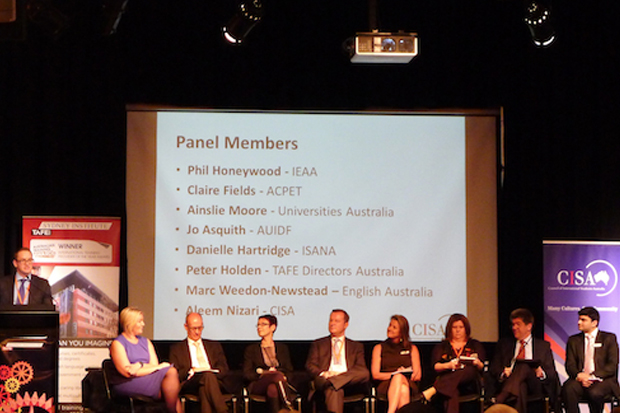CISA National Education Conference 2013
INTERNSHIPS, work rights, cost of living and initiatives to encourage industry best practice were on the agenda at this year’s CISA National Education Conference in Sydney. Diane Leow reports.
Some 250 delegates attended an education conference this week in Sydney, hosted by Australia’s international student peak body, the Council of International Students Australia (CISA).
In its third year, the conference attracted both local and international student representatives from postgraduate, undergraduate, private college TAFE, and foundation level, as well as government and education industry stakeholders.
Key issues
Important issues canvassed at this year’s conference included the lack of internship and work opportunities relating to students’ fields of study and post-study work rights.
Initiatives aimed at improving the quality of the overseas study experience were announced, such as the Student Welfare Services mobile app, a multilingual online orientation program that covers a wide variety of topics to prepare international students for their arrival into Australia; as well as the CISA Good Practice Program to encourage education providers to adopt best practice within the industry.
The Good Practice Program contained recommendations for key aspects of the student experience, including transparency of agent commissions, transportation, telecommunication and internet options, work rights, homestay standards and healthcare.
Walter Robles, a Law PhD student from Monash University, said he felt the two main issues international students faced were safety and the rising costs of living and studying in Australia.
With regards to the latter, Mr Robles said educational expenses were a significant investment and ought to provide students with an adequate return.
“We need to be sure that the parents’ money is recovered somehow – whether it’s a good degree we can actually use when we go back home, or possibly work in Australia and eventually (leading to) permanent residency and citizenship, which would change our lives. And that’s how the investment is recovered,” he said.
Industry needs to offer solutions
David Bycroft, director of student welfare services and executive chairman of the Australian Homestay Network, told Meld Magazine the industry as a whole needs to give the government a solution, instead of waiting for the government to provide them with the solution.
He said the Australian Homestay Network and Allianz Global Assistance have partnered with CISA in its lobbying efforts.
“Our view is that the CISA group is much more powerful than they even think,” Mr Bycroft said.
“We’ve already had some wins by us helping them with their lobbying. We’ve been able to fly Aleem into places for meetings with government on things like hospital costs, (and) hospital access for international students.
“We’ve now got a process and support in place so that any issue can be put into the Good Practice Program and then we could have a strategic attack on it, whilst we are solving the problem outside of government,” he said.
Mr Bycroft added that the most pressing issue was to improve communication between students and universities.
“It’s so easily fixed but it needs a commitment from the education provider to the CISA Good Practice Program. That is the solution for the education provider, to start to implement in their own institutions what CISA calls ‘good practice’, then follow those guidelines so that the issues that have happened in the past disappear,” he said.
Response from students
Elisha Hoong, president of The Singapore Link at Murdoch University, felt the conference was beneficial to the international student community.
“As an international student leader, the things that I could take away were things like visa, jobs; issues like (how to lodge effective) complaints… how students can actually improve their lives,” Mr Hoong said.
Other student delegates said they felt the conference could have been streamlined to better suit their needs.
Soe San Htike Pipi, a Bachelor of Arts student from the University Queensland, found some of the dialogue sessions and workshops “irrelevant at times or repetitive”.
“Some of the dialogue sessions touch on the same topics, just from different perspectives. When you have too much information on one topic, sometimes it can become unnecessary to know that much or know personal opinions,” the Burmese student said.
A number of students said more work had to be put in to raise the profile of the peak body, as they had only found out about CISA after their universities sent them an email informing them of the conference.
Outgoing CISA president Aleem Nezairi said the conference this year received a better response compared to last year and was “happy and excited” about the turnout.
What issues and topics would you like students, government and education industry stakeholders address at the next CISA National Education Conference? Share your views with us in the comments section below.

